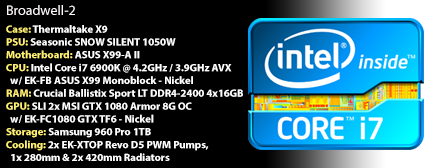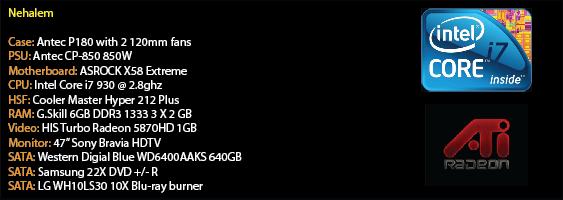Christmas Compy
Moderator: victimizati0n
Q12321 wrote:The HD's will need more amps than anything else really in order to spin those fuckers 120 times a second.
palmboy5 wrote:... the HDs dont need much power at all.. the motor is really small and usually only needs to have a little juice to keep the discs spinning.. the discs have their own momentum helping them along o.O
.........uh huh.. sure.Q12321 wrote:That's pretty much what I just fucking said...
For computers, buying cheaply and often will only leave you constantly in a world of shit.


Think of electricity as water in a bucket with a hole in the bottom:
The water is amperage: the push, current, of electricity.
The hole would then be voltage: how much of that push is getting through. This, in turn, is how resistance and voltage are direct opposites.
Now, assuming the hard drives need a fair amount of amperage, but not much of anything else, this just shows that those platters need a good "push" to move them and keep them moving, regardless of momentum.
This wouldn't mean that they burn off a lot of wattage though.
Assume that a hard drive uses an average of .6 amps at 12V and .4 at 5V. Also note that these two circuits are indeed parallel, one for movement, other for data transfer and shit. In parallel circuits, voltage is constant, amperage adds up. But, because the PSU is sharing that amperage it can give off with everything, it is not giving it's full potential to only the hard drives. It is in fact, a series-parallel circuit, in a way. If you take those above numbers, and add in Kirchhoff's circuit laws, you'll find the wattage for one HD. All of this would come out to around 10W for a HD, using my estimated numbers:
(.6*12) + (.4*5)
And, looking around online, most HDs are around 10-30 watts.
Go back to electrical basics, PB. True, I have to add in other components, but I only said that the HDs didn't use all that much power. Amperage, perhaps, but not power. Microwaves use power. Dryers use power. Little motors, as you said, no. Just some "push."
The water is amperage: the push, current, of electricity.
The hole would then be voltage: how much of that push is getting through. This, in turn, is how resistance and voltage are direct opposites.
Now, assuming the hard drives need a fair amount of amperage, but not much of anything else, this just shows that those platters need a good "push" to move them and keep them moving, regardless of momentum.
This wouldn't mean that they burn off a lot of wattage though.
Assume that a hard drive uses an average of .6 amps at 12V and .4 at 5V. Also note that these two circuits are indeed parallel, one for movement, other for data transfer and shit. In parallel circuits, voltage is constant, amperage adds up. But, because the PSU is sharing that amperage it can give off with everything, it is not giving it's full potential to only the hard drives. It is in fact, a series-parallel circuit, in a way. If you take those above numbers, and add in Kirchhoff's circuit laws, you'll find the wattage for one HD. All of this would come out to around 10W for a HD, using my estimated numbers:
(.6*12) + (.4*5)
And, looking around online, most HDs are around 10-30 watts.
Go back to electrical basics, PB. True, I have to add in other components, but I only said that the HDs didn't use all that much power. Amperage, perhaps, but not power. Microwaves use power. Dryers use power. Little motors, as you said, no. Just some "push."
Here to impress.
Alright, fine. Well I went and looked at what kind of amps CPUs would need and I stumbled upon this:
http://users.erols.com/chare/elec.htm
it would be best to compare the CPU you use but I don't remember what you have, I'm going to go with the Athlon 800MHz, which is 29.5A, and mind as well include the Athlon 64 3500+, which is 57.4A, both of which are well above your estimated 1A collective amperage for a hard drive. It would be safe to say CPUs need a "fair amount of amperage" as well, but CPUs take a lower voltage, 1.7V and 1.5V respectively, so they take a smaller dose of it too, making it a bit hard to compare.. especially when hard drives use 12V and 5V rails, while CPUs only use the 3.3V rail regulated by the motherboard down to the typical 1.5V for today's CPUs. It becomes a bit difficult to devise an equation to compare. Being the lazy person I am, I'm not going to try to make a makeshift equation, but I know that my approach would end up in the comparison of the Wattage. That of which, the CPU still needs more of, over the hard drive. So screw that I'm just going to compare Amps, as you said:
"The HD's will need more amps than anything else"
Right. Amps. Seems like just about every CPU that is able to run Windows 98 needs more Amps than a hard drive. But they need lower Voltage, so I don't know anymore...
EDIT:
To 2005, in your opinion, do you think a 145W PSU can boot an X2 3800+ (with fan of course) with a basic ECS mobo (with fan of course) and PCI video card from 1996? nothing else is connected other than the monitor. not even keyboard
http://users.erols.com/chare/elec.htm
it would be best to compare the CPU you use but I don't remember what you have, I'm going to go with the Athlon 800MHz, which is 29.5A, and mind as well include the Athlon 64 3500+, which is 57.4A, both of which are well above your estimated 1A collective amperage for a hard drive. It would be safe to say CPUs need a "fair amount of amperage" as well, but CPUs take a lower voltage, 1.7V and 1.5V respectively, so they take a smaller dose of it too, making it a bit hard to compare.. especially when hard drives use 12V and 5V rails, while CPUs only use the 3.3V rail regulated by the motherboard down to the typical 1.5V for today's CPUs. It becomes a bit difficult to devise an equation to compare. Being the lazy person I am, I'm not going to try to make a makeshift equation, but I know that my approach would end up in the comparison of the Wattage. That of which, the CPU still needs more of, over the hard drive. So screw that I'm just going to compare Amps, as you said:
"The HD's will need more amps than anything else"
Right. Amps. Seems like just about every CPU that is able to run Windows 98 needs more Amps than a hard drive. But they need lower Voltage, so I don't know anymore...
EDIT:
To 2005, in your opinion, do you think a 145W PSU can boot an X2 3800+ (with fan of course) with a basic ECS mobo (with fan of course) and PCI video card from 1996? nothing else is connected other than the monitor. not even keyboard
For computers, buying cheaply and often will only leave you constantly in a world of shit.


